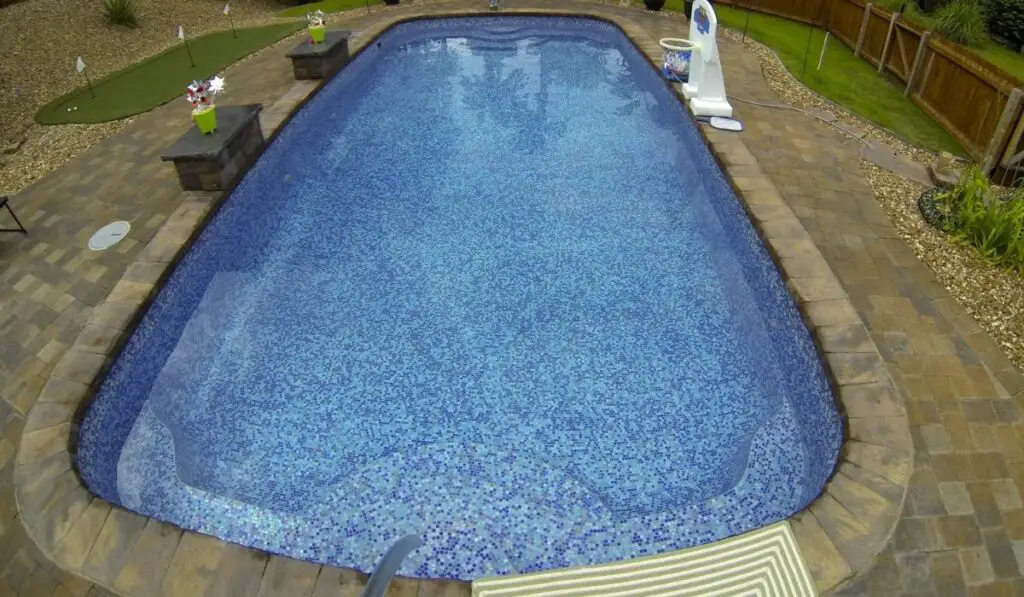Saltwater swimming pools have been gaining popularity over the years, and for good reason. They’re easy to maintain, which means they’re cheaper in the long run, and the installation process is practically the same as that of traditional chlorine pools. But can you use salt water in a fiberglass pool?
It’s safe to use saltwater in a fiberglass pool because the material is corrosion-resistant. However, the saltwater may corrode other pool fixtures and features, so you have to make sure they are protected, and that you’re using a saltwater generator that’s effective and doesn’t over-treat.
Let’s take a look at the various considerations to make if you’re thinking of having a saltwater fiberglass pool on your property. If you purchased a saltwater generate for use in a pool, it almost certainly does all the things to prevent over-treating without you having to think about it or life a finger. That said, pools are so expensive that it’s good to know what’s going on, even if your attention isn’t needed right away to manage something.
Salt Water vs. Chlorine

A saltwater pool is a perfect alternative to conventional chlorine pools. The water in such conventional pools is normally balanced using chlorine tablets or liquid chlorine.
Other parameters that require adjustment include calcium hardness, pH, and alkalinity. Saltwater pools must also be balanced using the same chemicals, with the exception of chlorine. Your saltwater pool may even need some pool shock once in a while.
Rather than depending on chlorine bought from a store, however, a saltwater pool creates its own chlorine through electrolysis. All you have to do is add pool-grade salt (on Amazon) to your chlorine generator, which runs the saltwater through two electrodes that electrolyze it to generate chlorine.
As you can see, a saltwater pool is also sanitized using chlorine, but the chlorine used in saltwater pools differs from that used in conventional pools.
First, it is generated through electrolysis, and secondly, it contains fewer chloramines, which are associated with the chlorine feeling and smell in conventional chlorine pools. Saltwater pools are generally gentle on the body. They don’t cause the eye redness and respiratory irritation that affect some people after swimming in chlorine.
And one other thing – you’ll want to make sure you’re using a quality saltwater generator that is designed for pool use, and for a pool of your size as well. Take note of the features that a model like the Intex Saltwater System (on Amazon) has, and consider whether or not your saltwater generation setup is effective in your pool.
Can Salt Water Be Used in a Fiberglass Pool?
The short answer is yes. A fiberglass swimming pool is perfectly compatible with saltwater. This is unlike vinyl liner pools, which can be corroded by saltwater, especially those with metal parts that are in contact with the pool water.
Saltwater is one of the abrasive chemicals that can corrode and eat through metals. That’s why it affects the interior surfaces of gunite or concrete pools more so those with plasters within them.
Another bit of good news is that a saltwater fiberglass pool requires less work and less maintenance than other types of pools. For example, boats made of fiberglass last a long time in marine water because this material is known to hold up well against the various substances found in sea or ocean water.
So, long story short: Saltwater is a good choice for your fiberglass pool. The saltwater will not have any negative effect on your pool.
The Benefits and Drawbacks of Saltwater Pools

Saltwater pools aren’t perfect. The pros and cons of this option include:
Saltwater Pool Pros
- Saltwater pools require less chlorine compared to traditional chlorine pools. Moreover, you won’t need to store any harsh chemicals in the pool. The chlorine in the saltwater pool is generated by an adjustable chlorine generator, so you only need to store harmless salt rather than chlorine.
- Saltwater is good and feels better on the hair, skin, swimsuits, eyes, and more. This is unlike chlorinated water, which will remove the natural oil from your hair and skin, resulting in itchiness and dryness of the skin. If you have extremely sensitive skin, you may not be able to comfortably swim in a chlorine pool.
- Saltwater pools don’t require as much maintenance as chlorine pools. Once you set your chlorine generator, you can simply forget about it.
You’ll only need to restock it with salt occasionally to ensure your pool gets an appropriate chlorine level. You may also need to check the chemical levels in the pool and adjust them accordingly.
- Saltwater pools are affordable in the long run. In one year, you would spend more on a chlorine pool than you would on a saltwater pool.
Saltwater Pool Cons
- A saltwater pool costs more to install, especially because you’ll have to buy a chlorine generator. Plus, the cells need to be replaced every 3–7 years.
- Saltwater is corrosive, so even if your pool is made of fiberglass, the water may still be in contact with some pool fixtures and features, causing them to corrode.
- The chlorine generator will not produce chlorine if the water is colder than 60 degrees.
- The chlorine generator may break down at some point, and repairs can be costly.
Things You Need to Know Before Getting a Salt Water Pool
There are a few more things you should know before installing a saltwater pool. These include:
- A saltwater pool can freeze if you leave it full during the winter.
- The pool needs a filter system just like the traditional chlorine pools.
- A saltwater pool has chlorine generated from the salt using a chlorine generator.
- A saltwater pool doesn’t taste salty, nor does it have the smell of chlorine.
- Although the level of chlorine is low in a saltwater pool, the pool is properly sanitized and germ-free.
- There’s a risk of the saltwater corroding some parts of the pool, such as some fixtures or features.
- You can use ordinary table salt in your saltwater pool, provided it’s not anodized. However, it’s cheaper to use pool salt.
Conclusion
In light of what has been discussed above, you can see that a saltwater pool is generally a good investment. It’s easy to install, safe to use, and easy to maintain.
When using this pool, you need not worry about eye or skin irritation, and your hair and swimsuit will remain in good shape. To increase the lifespan of your saltwater pool, make sure you maintain it well.
